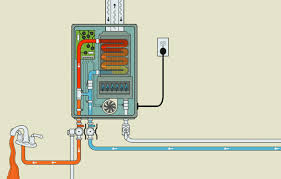


A leaking water heater can quickly turn from a minor inconvenience into a major problem. Water heaters are crucial for providing hot water throughout your home, and a leak can lead to water damage, mold, and high repair costs. If you notice signs of a leak, it’s important to address the issue promptly. This guide will help you understand the causes of water heater leaks and offer solutions to fix them.
Water heater leaks can originate from several parts of the unit. Common sources include:
Professional plumbers have the tools and expertise to diagnose and fix complex water heater issues. They can perform thorough inspections, make precise repairs, and ensure that your system is functioning safely and efficiently.
Addressing a water heater leak promptly can save you from extensive damage and costly repairs. By understanding the common causes and knowing when to attempt DIY fixes versus calling a professional, you can manage your water heater effectively. If you’re experiencing a leak or any other issues with your water heater, contact Crossville Heating and Cooling for expert service and reliable solutions. We’re here to help keep your home’s water system running smoothly.

Look out for slow draining sinks and tubs, bad smells from drains, and strange gurgling sounds. Other signs include clogs in many fixtures, water backing up, and overflowing toilets. You might also notice outdoor smells, spongy ground, and changing water levels in the toilet bowl.
Recurring clogs, even after trying to clear them, and seeing fruit flies or insects near drains are also red flags.
A plumbing inspection checks a home's plumbing system. This includes pipes inside and outside, like hose bibs, sinks, and toilets. It's a detailed check that goes beyond a simple home inspection.
Plumbing emergencies include water leaks, burst or damaged pipes, and sagging or discolored ceilings. They also cover low water pressure, overflowing toilets, and clogged drains. Other issues are water heater failure, gas leaks, and sewage backups.
These problems can cause a lot of water damage, health risks, and safety issues. They need quick action by a professional plumber.
A slow draining sink or tub means there's a clog in the drain. A pro can fix this easily.
Getting a plumbing inspection helps spot problems early. It shows the plumbing's condition to potential buyers. And it stops small issues from becoming big, costly ones.
It's important to fix plumbing problems fast to prevent water damage and mold growth. These issues can harm your home's structure and your family's health. Waiting can lead to expensive repairs later.
Bad smells from drains or toilets might mean a sewage backup or trapped debris. This could be dangerous and needs quick action from a pro.
There are two main types of plumbing inspections. A visual inspection looks for leaks or problems with water and sewer fittings. A camera inspection uses high-resolution cameras to see inside pipes and the sewer line.
Look out for wet spots on floors or walls, discoloration, and sounds of running water. These signs mean you might have a serious water leak. Ignoring it can cause more damage, mold, and structural problems.
Gurgling sounds from drains usually mean air is trapped in the pipes because of a blockage. A pro plumber should check it out.
A plumbing inspection checks sinks, toilets, and pipes. It looks at outdoor faucets and the water heater too. Sometimes, it includes a camera inspection of the sewer line.
A burst pipe can spill hundreds of gallons of water quickly, damaging walls, floors, and furniture. It's often caused by freezing, corrosion, or high pressure. You need a professional plumber right away.
Clogs in many fixtures at once often point to a blockage in the main drain line. This needs a pro's help to avoid more damage.
A plumbing inspection usually costs about $200. Visual inspections are cheaper, but camera inspections can be up to $500. You might also need to pay for repairs if problems are found.
Sagging or discolored ceilings suggest a hidden water leak. This can lead to structural damage and mold growth. These signs mean water has been leaking behind walls or ceilings for a while.
Water backing up is usually due to a clogged drain or sewer line. This can cause damage and health risks. So, getting a pro to fix it quickly is key.
Experts suggest getting a plumbing inspection every two years. If your home is over 40 years old, consider an annual check to keep the plumbing in good shape.
Low water pressure is a problem if it affects many faucets or fixtures. It can be caused by a failing pressure regulator, clogged pipes, or municipal water issues. This needs quick action.
An overflowing toilet means there's a blockage deep in the drain or sewer line. A pro plumber should handle this to prevent more problems.
There's no special prep needed, but knowing about any issues like slow drains or leaks is helpful. Tell the inspector about these problems before the inspection.
Try using a plunger or turning off the water supply to the toilet. But if it keeps overflowing, call an emergency plumber. They can fix it before more damage happens.
Bad smells and wet or spongy ground near sewer lines or drains hint at a blockage or damage. A pro can check and fix it to protect your property.
Regular inspections catch small problems early, avoiding big, costly repairs. They prevent water damage and ensure your plumbing works well. They can also make your home more appealing to buyers.
A broken water heater is an emergency if it has gas leaks or could cause water damage. Signs include no hot water, strange noises, or leaks. Call a plumber if you notice these.

.jpg)





.png)




